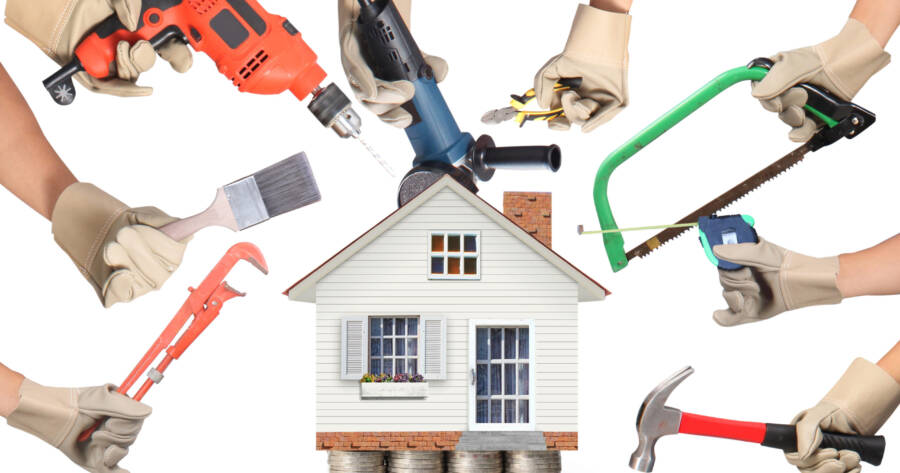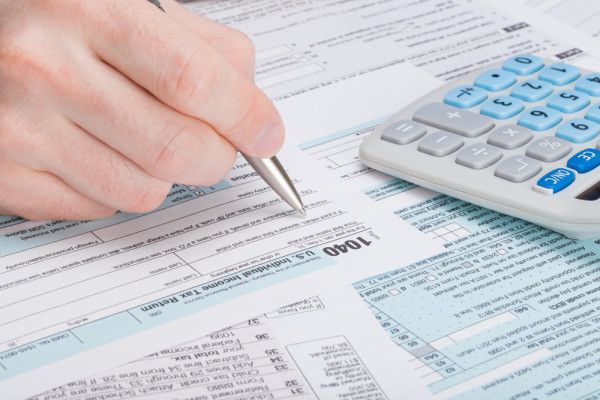Tax credits reduce your tax bill on a dollar-for-dollar basis. However, deductions are what lower your taxable income. The good news is that some home improvements can make your living space better and reap you benefits on your taxes too. There are multiple tax deductible home improvements you can undertake. That new bedroom might just increase your refund. In this article, we’ll show you what kinds of home improvements you can deduct from your taxes. We’ll even show how this can apply to rental properties. Who knows, getting more money back from the IRS could even be the start of your next home improvement project. So, can you write off your home improvements this year? Read on to find out.
Home Improvements vs. Repairs: Know the Difference
Before you start any work on your home or rental property, be sure you’re clear on the difference between a home improvement and a home repair. This distinction will be critical come tax time. The last thing you want is to end up in hot water with the IRS because you tried to pass off a repair as an improvement on your tax return.
Let’s go over a quick description of both a repair and an improvement. Once you understand the difference between the two (which is actually fairly obvious when you think about it), you’ll know how to proceed at tax time.
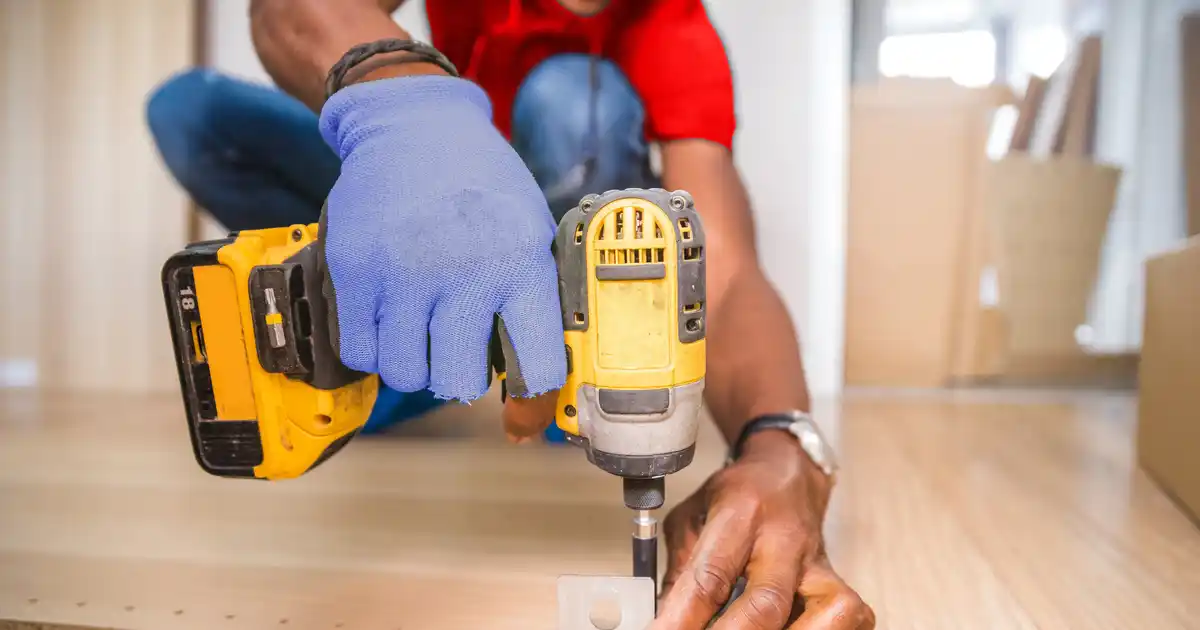 Shutterstock
ShutterstockImprovements
According to the IRS, a capital improvement is any upgrade or modification that “substantially adds value to your house, prolongs the life of your home or adapts it to new uses.” Increasing the number of bedrooms and/or bathrooms in your home would be an improvement, for example. So would installing energy-efficient outdoor lighting.
Other common examples of home improvements are a new roof, new driveway, a new septic system, or brand new appliances. These expenses would be tax deductible or tax credits, depending on the improvements undertaken. Some home improvements are only tax deductible in the year the house is sold, so make sure you keep all receipts and documentation.
 Shutterstock
ShutterstockRepairs
The IRS defines a repair as “any modification that restores a home to its original state and/or value.” For example, repairing and/or replacing window screens don’t necessarily add value to the house. Instead, you are merely restoring the original condition of the property. More mundane fixes, like repairing a leaky faucet or replacing a few broken roof shingles, are also merely repairs.
In general, home repairs are not tax deductible. However, there are a few exceptions. Repairs made after a natural disaster, repairs to a rental property, and repairs to a home office may also qualify for tax deductions. We’ll discuss these more in a minute.
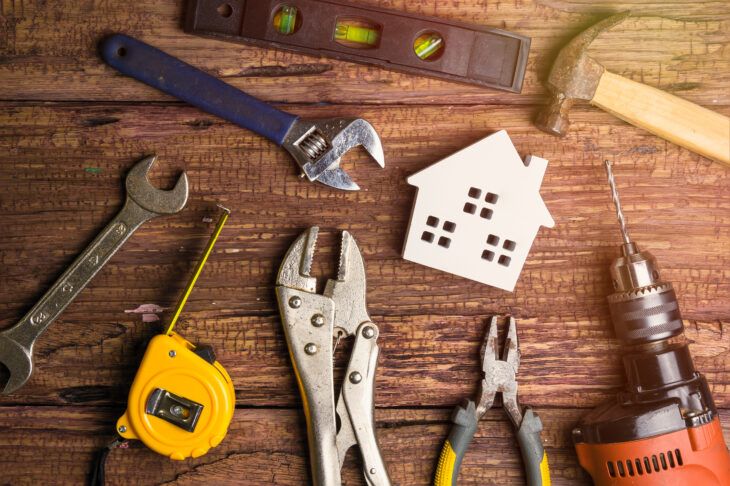 Shutterstock
ShutterstockWhen to Claim Home Improvement Deductions on Your Taxes
You can — and should — claim tax deductions in the year your home improvements were done. However, some improvements must be claimed over a few years’ time. Some can only be claimed if you sell the property. For instance, any energy-efficient upgrades you made should be claimed for the energy efficiency tax credit within the same year. That goes for any improvements you make to your rental property or home office.
For projects such as a new roof, the deductions can be taken out over several years through something called accelerated depreciation, or MACRS (modified accelerated cost recovery system). The IRS has a detailed page about it here, or you can ask your local tax professional how to make it work on your own tax return.
 Shutterstock
ShutterstockTypes of Home Improvement Deductions
Here are some specific types of home improvement deductions you can make, depending on what changes you make to your home:
6. Energy-Efficient Improvements
There are a variety of upgrades you can make to your home that improve your energy use. Examples include geothermal heat pumps, solar-powered water heaters that heat at least half of the home’s water, and double- or triple-paned energy-efficient windows. Many newer homes may have these types of improvements already.
This is typically a tax credit you might take on an older house that needs some updating. Note that you can claim tax credit on energy-efficiency improvements you do to your rental property as well.
 Shutterstock
Shutterstock5. Improvements to Your Home Office
A home office is defined as a space you use exclusively for business purposes on a regular basis. According to BudgetDumpster, “home office improvements are deductible over time with depreciation, and repairs are deductible within the tax year they are completed, since they’re considered necessary for the upkeep of your business.”
Typical improvements include new paint, lighting, or flooring. If the pandemic saw you transition to working from home on a more regular (or even permanent) basis, this could be a great choice for you.
 Shutterstock
Shutterstock4. Rental Property Improvements
Unlike with your primary residence, improvements to rental properties “don’t even need to be upgrades that add substantial value to the property.” Repairs could include projects like fixing damaged cabinets, cracked tiles, faulty appliances, or even the air conditioning.
It’s common to do these minor repairs whenever a tenant moves out. These types of improvements should be claimed in the same year they were completed. However, redoing a kitchen or bathroom will add value to your property for many years to come. That means you can’t deduct the entire cost in a single year.
 Shutterstock
Shutterstock3. Improvements Based on Medical Care
Customizing your home to fit your medical needs can be quite expensive. However, you do have the opportunity to deduct some of the cost from your taxes. This comes in handy if someone in your house has any sort of accessibility needs that require modifications or upgrades to your home.
In fact, in addition to the cost of making these improvements, you can also deduct any expenses you have to operate and maintain those medically necessary additions. Shower handrails, wheelchair ramps, wider doors and hallways, and any other improvements made for medical purposes are tax deductible.
 Shutterstock
Shutterstock2. Improvements For Resale Value
Any improvements made to your house that increase the resale value are tax deductible, but not only in the year they’re made. This is because they benefit the property over time by adding lasting value. Examples of this type of improvement include permanent additions, installing a security system, adding in a swimming pool, or major landscaping. You may need to spread out these deductions over a few years.
You may deduct these over time through the use of MACRS depreciation. Depending on the improvement made, you will need to follow a specific, relevant depreciation schedule to deduct these expenses over their expected useful lifetime. Typically, these will be deducted in under seven years but can vary depending on the type of improvement. Consult the IRS tax guidelines to learn exactly what you need to do to claim these depreciation deductions and lower your taxable income accordingly.
 Shutterstock
Shutterstock1. Casualty and Theft Improvements/Repairs
This one gets a bit tricky. In order to claim a tax deduction on repairs necessary due to a natural catastrophe, “the disaster needs to be a ‘federally declared disaster’ by the President of the United States.” So simply replacing roof shingles after a night of high winds won’t qualify, but a federally recognized tornado disaster would.
You won’t even really get a tax deduction, per se. It’s more of a break on the damage or losses, which will be helpful when budgeting for repairs. You will have to itemize your deductions. If your insurance company reimburses you, however, you won’t be eligible for the deduction.
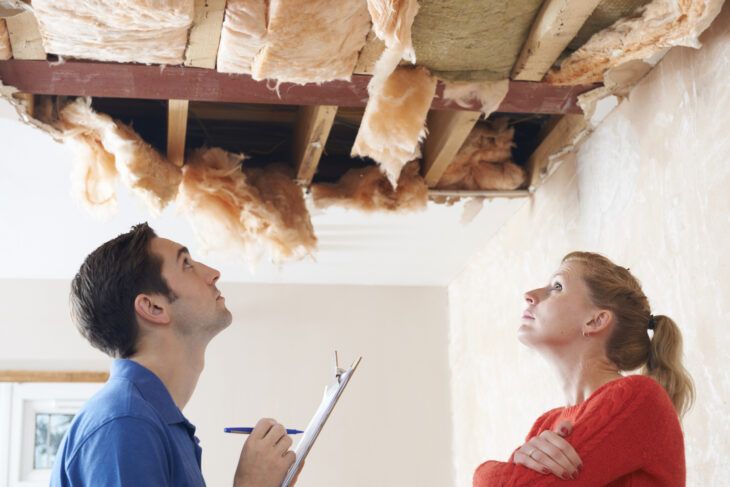 Shutterstock
ShutterstockMake the Most of Your Remodel
We recommend speaking with a tax professional in your area before starting any home renovations. It’s much easier to be prepared ahead of time. Specifically, it’s better to keep track of your expenses as you incur them, rather than to have to think back at tax time. You don’t want to be tracking down receipts that might be long gone.
Another professional you might consider consulting is a realtor. Even if you’re not thinking of selling your home, it’s a good idea to see what other houses comparable to your own property have in terms of upgrades. You might find inspiration in what has been done to these properties. Or you might find out what to avoid when completing your own improvement project.
 Shutterstock
ShutterstockMost Common Improvements
The most common improvements to make include updating kitchen cabinets, adding rooms or bathrooms, and replacing doors and windows. According to TaxAct, “for a mid-range kitchen remodel, you’ll recoup about 57 percent of the cost. For a mid-range bath remodel, you’ll recoup about 70 percent of the cost.” A realtor will know what upgrades will garner you the most profit when it does come time to sell your home. They can advise you where your money will be best spent.
You should also know that opting for tax deductions will likely require you to itemize your deductions. Claiming the deductions you’re eligible for is only worth the effort if all of your itemized deductions exceed the IRS standard deduction. That number is $12,550 for the 2021 tax year for individuals, and twice that for married couples. Keep that in mind as you tally up your expenses and prepare your taxes.
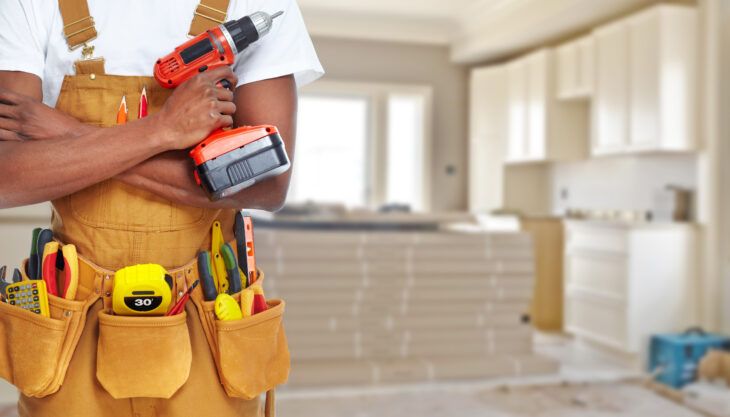 Shutterstock
ShutterstockImprove Your Home, Increase Your Tax Return
Renovating your home can be a huge task. When you do, it’s always good to know that you can deduct some of the cost. Just make sure to research your particular improvements ahead of time. And make sure you keep all your receipts. If the whole thing seems confusing to you, it’s never a bad idea to consult a professional. A licensed accountant or tax professional will be able to properly guide you on your home improvement journey. In no time at all, you’ll be well on your way to both upgrading your home and enjoying the financial benefits, too.
